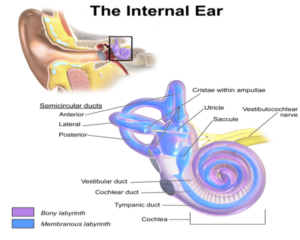Ringing, buzzing, roaring, crickets, hissing, static, pulsing, screeching, ocean waves, sizzling, cicadas, dial tones, whooshing…… Tinnitus can be described as many sounds. Many annoying sounds. And for those afflicted with this unwelcome noise in their head, life can be distracting. Tinnitus is the hearing of sound when no external sound is present. It is considered a symptom rather than a disease. Tinnitus affects approximately one third of Americans throughout some point of their lives; and up to 15 % are concerned enough to seek medical evaluation and treatment. Full disclosure: Tinnitus can be one of an Ear Nose and Throat Provider’s more difficult conditions to treat! As a provider, we covet the reality of our patients getting better from the treatments we provide. But tinnitus can be stubborn like a mule! And I’m not just the president of Hair Club for Men, I’m also a member…. (I have tinnitus too).
Tinnitus is broken down into subjective versus objective with objective being much more rare. Subjective tinnitus is heard only by the person experiencing it whereas objective tinnitus can be detected by someone else. An example of objective tinnitus is pulsatile noises in rhythm with the person’s heartbeat audible by stethoscope to an examiner. Tinnitus can be perceived in the ears or in the head, as well as in a single ear or both. It can be intermittent or constant and associated with movements of the face, neck, and upper body.
Tinnitus can be associated with a multitude of otologic disorders. Occasionally, neurologic, metabolic, and psychiatric conditions are at play. Noise in the ear is commonly associated with cochlear damage from hearing loss. Presbycusis or age-related hearing loss is a common culprit. Other common ear problems associated with tinnitus include noise exposure (guns, machinery, and aircraft), Meniere’s disease, and ototoxic medications. Assessment of tinnitus will involve your ENT provider reviewing your health history, evaluating audiologic (hearing) tests, and performing an ENT exam. Depending on the type of tinnitus you describe, and underlying associated symptoms, your provider may order additional testing. For example, we tell our patients that pulsatile tinnitus is the Pandora’s box of ENT. Although usually benign, pulsatile tinnitus can be associated with more sinister vascular phenomena and can warrant extensive imaging. Tinnitus that is associated with ear fullness and dizziness may be associated with a treatable condition called Meniere’s disease usually confirmed with additional inner ear testing.
Management starts with prevention. Because prolonged noise exposure can be associated with tinnitus and hearing loss, hearing protection around firearms and loud machinery is crucial. Avoiding ototoxic medications when possible is important. Next, we treat any underlying condition (Meniere’s disease, middle ear infection, or medication side-effects to name a few). Hearing aids and masking devices can be helpful for some. Psychological support in the form of tinnitus retraining therapy, cognitive behavioral therapy, and relaxation techniques such as biofeedback are often successful. White noise machines and apps that produce simulated environmental sounds such as falling rain or ocean waves are often helpful. Sufferers of tinnitus are advised to avoid possible irritants such as caffeine, alcohol, and nicotine. Also try covering the noise with a fan, soft music, or low-volume radio static when in quiet environments. Stress management, as with many conditions, is critical. Medications and supplements can also work for some tinnitus sufferers although general consensus in the ENT community is that there is no “magic pill” to fix tinnitus.
Make sure you find a provider willing to investigate tinnitus and work with you on a treatment plan. Tinnitus is not a “one-size-fits-all” problem. Therapies that work for your hair stylist and sister’s husband’s cousin’s mom, won’t necessarily work for you. But most people get better; or learn to live with their noisy guest. Please visit the following sites for more information:
· http://www.mayoclinic.com/health/tinnitus/DS00365
· http://www.ata.org/home
· http://www.asha.org/
Kari Kingsley, MSN, CRNP is an otolaryngology nurse practitioner with over 10 years of ENT experience. She is a medical writing consultant for Inside Medicine and enjoys writing articles on pertinent material to keep the residents of North Alabama up to date at the forefront of medicine.





